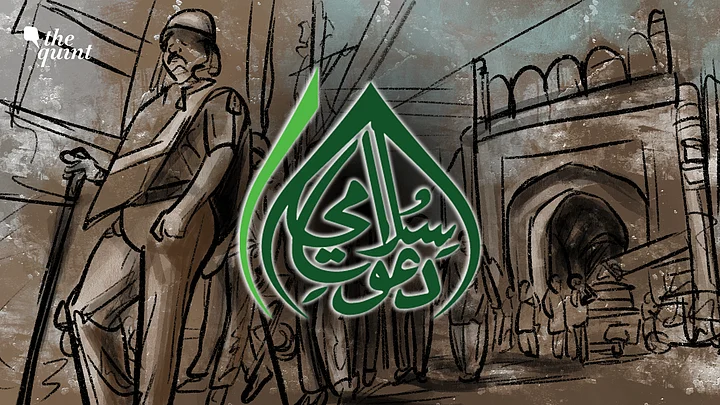A day after the horrifying murder of a tailor in Udaipur, Rajasthan DGP ML Lather indicated that Gaus Mohammad, one of the main accused in the incident, had connections with the Pakistan-based Islamic organisation, Dawat-e-Islami (DeI).
"One of them also went to Karachi in Pakistan in 2014 to meet the organisation. We're considering the incident an act of terror," the DGP told the press on Wednesday, 29 June.
Calling insinuations of such affiliations 'mischievous,' Pakistan's Foreign Office denied having any links with the attack, saying that it was "typical of the BJP-RSS ‘Hindutva’ driven regime’s attempts at maligning Pakistan, including by externalising their internal issues."
Dawat-e-Islami, which considers itself to be a "global non-political Islamic organisation working for the propagation of the Quran and Sunnah," had last attracted attention in September 2020, when a Pakistani national stabbed two people outside the office of the French satirical magazine, Charlie Hebdo.
The Charlie Hebdo stabbing incident and the brutal murder of Kanhaiya Lal in Udaipur earlier this week, were claimed to be done in retaliation to committing blasphemy against Prophet Muhammad.
But what is Dawat-e-Islami? Is it a radical organisation? What is its ideology? Here is all you need to know.
'Soft Islam' & the Beginnings of DeI
Founded by Muhammad Ilyas Attar Qadiri in Pakistan's Karachi in 1981, the Del was seen as the Barelvi – a Sunni co-sect – response to what they perceived to be the Deobandi's (the other co-sect) takeover of Islam, The Indian Express reported.
The Sunni cleric preached Islam on the same lines as the Deobandi missionary group, Tableeghi Jamat.
The report indicated that Qadiri was born in 1950 to a Kutchi Memon family in Karachi. His parents belonged to Junagarh in pre-partitioned India.
DeI's establishment coincided with a period of time that saw Pakistan abetting the growth of Saudi-funded Islamic outfits. The United States, meanwhile, was ensuring a steady supply of weaponry to the region in light of the first Afghan War against the Soviets.
As per the Indian Express report, the Pakistani military establishment supported the Deobandi sect, and jihadi tanzeems were allegedly built in Deobandi mosques.
However, after the Pakistani establishment became an 'ally' in the US-led 'war on terror,' the then military ruler Pervez Musharraf reportedly thought of employing Barelvism to counter the Taliban ideologically.
The Issue of Blasphemy & Radicalisation
The Barelvi sect's propagation of 'soft' Islam lasted till January 2011, when the Governor of Pakistan's Punjab, Salman Taseer was shot dead.
Consequent investigations revealed that Taseer was killed by a bodyguard, Mumtaz Qadri, who was allegedly affiliated with DeI.
However, the then DeI spokesperson, Mahmood Ahmed Attari, distanced himself from the crime, iterating that the Barelvis do not believe in such aggressions, AFP reported.
Still, Taseer's assassination had altered the face of the organisation. In 2015, another Barelvi faction, Tehreek-e-Labbaik Pakistan (TLP) was founded, and several members of the DeI joined the Labbaik.
With origins rooted in the 1981 group, the TLP held absolutist views on issues of blasphemy and the finality of Prophet Muhammad.
In the years following the Charlie Hebdo attack in 2020, the Labbaik even mobilised to encourage the severing of relations between France and Islamabad.
Meanwhile, Sunni Tehreek, another Barelvi group overlapping with the DeI and established to protect Barelvi mosques against Deobandis, is now reportedly known for rallying with 'tauheen-e-rasalat ki ek hi sazaa, tan sey sar juda' (beheading is the only punishment for anyone who insults the Prophet).
The Dawat-E-Islami Mission Now
Currently, the DeI operates in several parts of the world, working primarily as a proselytising group. Members of the group are often seen wearing a green turban, symbolising the green dome of the Prophet’s Mosque in Madina.
Their website reads, "Dawat-e-Islami is a global Islamic organization in Pakistan working on a large scale for the propagation of Islam. Dawat-e-Islami constantly spreading the teachings of the Holy Quran and the Sunnat across the world with the help of thousands of employees, volunteers and preachers."
Further, the group operates the Madani broadcasting channel, runs charities and trusts, and undertakes Madani Qafila (missionary travel).
"Innumerable Madani Qafila of devotees of Rasul keep travelling from country to country, city to city and town to town for 3, 12 & 30 days and even for 12 and 26 months in order to spread religious knowledge, Sunnah and call towards righteousness," the group claims on its website.
It is important to note that the Da’wat-e Islami in India, based in Mumbai presently, is a breakaway Sunni faction and has no connection with the Pakistani DeI.
(With inputs from Hindustan Times, Dawn, The Indian Express, AFP, and Reuters.)
